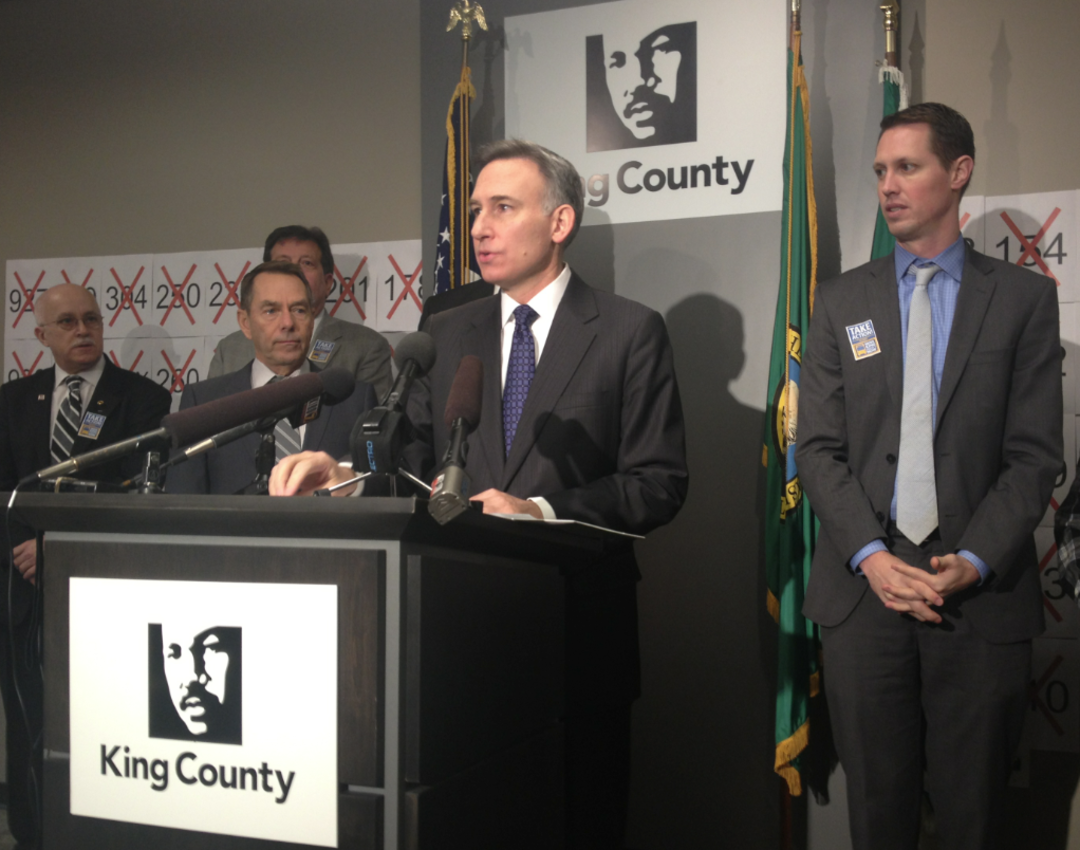County Leaders Announce "Plan B" if State Transportation Package Falls Through

King County Executive Dow Constantine.
King County Executive Dow Constantine, Metro general manager Kevin Desmond, Metro union director Paul Bachtel and other county leaders announced a proposal today to put a new tax package before county voters—including a sales tax increase and a flat vehicle-license fee—to preserve Metro bus service (which faces cuts of "up to" 17 percent—more on that later) if the state legislature fails to pass a transportation revenue package that gives King County the authority to ask voters for a new motor vehicle excise tax.
At this morning's briefing, Constantine said, "We’ve done everything lawmakers have asked of us, and all we have asked for in return is for them to free us; all we have asked in return is to let the people of King County decide whether thay want to save Metro bus service and maintain our roads through an increase in the MVET."
Constantine, along with King County Council transportation committee chair Larry Phillips, said the legislature needed to hold a special session by the end of the year to adopt legislation that includes an emergency clause, which would allow the county to ask voters for a 1.5 percent MVET next year (and prevent transit cuts).
County leaders' first option, a special session, is a tall order; the legislature declined to hold a special session this week, which would have been their fourth this year, after the house and senate couldn't agree on a package.
(The house version, although far from ideal from environmentalists' point of view, did include millions more for safe routes to school, transit, and bike and pedestrian improvements; the senate version also strips funding from the Model Toxics Cleanup Act to pay for stormwater cleanup on highway retrofits, which is traditionally funded through the gas tax).
"The house package that passed last year, although it had minimal investments in transit, stormwater, and pedestrian and bicycle programs, met a threshold we were willing to accept," Washington Conservation Voters' state lobbyist Cliff Traisman says. "If you continually take money from [toxics] cleanup, with a backlog of billions of dollars, you're never going to get the job done."
So far, the business community, labor, and environmentalists have hung together as the Keep Washington Rolling coalition, which backs the house transportation proposal. However, with business getting "pretty much what it wanted" in the senate deal, in Traisman's words—that is, lots of money for megaproject completion and new highways—it's unclear how long the coalition will hold together.
"One of the things we’ve proven with gas tax packages is that there do not have to be winners and losers, but right now it looks like the environmental community is going to be the loser with this package," Traisman says.
So: On to option two. If the two houses can't reach a compromise by early next year, Constantine said, the county will go to voters as soon as April with a proposal to create a Transportation Benefit District that would impose a new vehicle license fee of up to $100 ("but it won't be that much," Constantine said), plus an increase in county sales tax, to provide a combined total of $140 to $150 million; Constantine said he didn't know what the final mix of the two taxes would be.
"The people of King County cannot be held hostage, and if our state leaders do not act, if they do not reach agreement this year, we must take action on our own," Constantine said. "We recognize that this Plan B would be imperfect, but in the absence of any action by the state, an imperfect local option will be necessary."
Although Constantine said he recognized that a VLF (which is the same no matter how much your car is worth) and a sales tax (which is regressive) weren't ideal, the county wasn't considering other options that are possible under a TBD, like a property tax or local gas tax, because they're "less robust" than the VLF or sales tax (or the MVET, which increases as people buy more expensive cars.)
The King County Council would have to approve a new tax proposal by February for it to go before voters in April; temporary funding for Metro, which the legislature approved two years ago, expires in June.
The last announcement was the ATU contract, which still has to be approved by the union rank and file. That contract would freeze wages for one year and increase them by 2 percent over the following two years, with an additional 1.67 percent increase in the third year if Metro manages to preserve bus service at current levels.
Finally, back to those looming cuts. Sales taxes (the main source of Metro's funding) are rebounding as the economy recovers and people spend more money. That means that the cuts Metro will have to make could be "only" between 450,000 and 500,000 hours a year, as opposed to the 600,000 (or 17 percent) cuts Metro has been announcing. Still, as Metro GM Desmond pointed out, that's an awful lot of service to eliminate at a time when buses are overflowing and demand for transit service is higher than ever.




